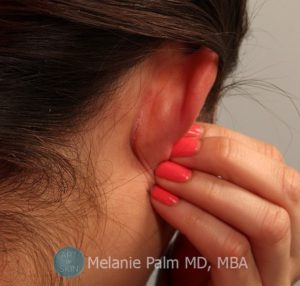Anyone who has suffered from eczema knows the feeling of burning or itching that precedes the redness and irritation to come. This usually shows up on the neck, inside of the elbows, back of the knees, lower legs and hands – and can be problematic to everyday life when not evaluated and treated by a board-certified dermatologist. A visit to your doctor can arm you with extremely helpful tips for a comprehensive skincare program to both treat flares of eczema and reduce future re-occurrences. Here, Dr. Palm breaks down exactly what eczema is and how to best treat it.
What is Eczema?
Known as “the itch that rashes,” eczema is the name for a group of conditions that cause the skin to become red, itch and inflamed. The medical term is “atopic dermatitis” and is often described as the itch that rashes. It forms when the skin barrier is compromised in predisposed individuals, this causes microscopic skin fissures, or openings in the skin, that lead to nerve excitation, inflammation, itch and a skin rash. It is considered as one-third of the “atopic triad,” a constellation of conditions that run through “atopic” families. The other two conditions are allergic rhinitis (allergies) and asthma.

Who Is Prone To Eczema?
Anyone with a family history of the “atopic triad” of conditions or with a personal history of asthma or allergies are more prone to develop eczema. If you notice a lot of lines on your palms, or hyperlinear palms, or if you have very dry lower legs, these can be indicators of ichythosis vulgaris, a dry skin condition that is common in eczema patients.
Dr. Palm mentioned that there is a “hygienic theory” of atopic dermatitis in developed countries that links the cleanliness of countries such as the U.S. (think hand sanitizer, eliminating germs everywhere possible) to eczema. It is thought that the uber-cleanliness prevents young children from being exposed to environmental allergens, leading to a hypersensitive immune system later in life that can lend itself to conditions such as eczema.
How is Eczema Different From Other Conditions?
The course of eczema is completely different from person to person. Dr. Palm said many eczema patients manifest the condition initially during childhood and see improvement into adulthood, although some patients do experience outbreaks during adulthood.
External factors can sometimes impact or exacerbate eczema flares. Things such as decreased humidity, extreme temperatures, irritant chemicals, perfumes, makeup, harsh soaps and medications can all play a role in the recurrence of the condition. Even stress has been linked to eczema flares, Dr. Palm said this is likely due to stress’s creation of pro-inflammatory response throughout the body, which can act as gasoline on the eczema fire. This is because eczema causes the immune system to be in a pro-inflammatory state, so it is no surprise that stress can increase the severity of eczema.
Is There A Cure For Eczema?
There is no cure for eczema, but the symptoms can be controlled. For starters, Dr. Palm recommends that any inciting factor is limited. She also focuses on soothing flare ups and says that it is important to start with repairing skin barrier functions. This can be done with using skin cleansers and moisturizers that contain key ingredients such as ceramides, free fatty acids or hyaluronic acids. It is also important to be sure that skin cleansers and moisturizers don’t contain things like harsh detergents, fragrances or preservatives.
Perhaps one of the most frustrating symptoms of eczema, itching, is often controlled with anti-histamines. And, it’s important to decrease inflammation, which is typically accomplished with anti-inflammatory topical medications such as corticosteroids, topical calcineurin inhibitors and an anti-inflammatory called Eucrisa.
Dr. Palm cautioned that many eczema patients also have a heavy load of the bacteria Staph on their skin, which can lead to secondary infection (impetiginization) and can cause a further flare of eczema. To treat this, dermatologists have a specific recipe for a very dilute bath with an extremely small amount of household bleach that can decrease the bacterial amount on the skin without irritating it. She also said there are very severe cases of eczema that require systemic treatment, which can range from the more traditional oral medications to newer “biologics” which include injection and IV medications that are reserved for very severe and recalcitrant cases.
As always, if you think you might be suffering from eczema (or any skin condition), it’s best to consult with a board-certified dermatologist to be sure that you receive the treatment plan that is best for you. Call us to schedule your appointment with Dr. Palm at 858-792-SKIN (7546).

